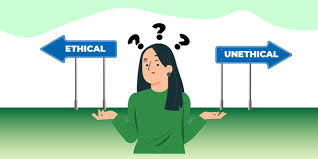When Your Values Collide: Navigating Ethical Clashes at Work
We all bring a personal set of ethics to the workplace.
Honesty, fairness, integrity – these are the ideals that guide us in our daily
lives. But what happens when the organization you work for has a different set
of priorities? This is where things get tricky. Clashes between organizational
ethics and personal ethics are a common source of stress and frustration
for employees.
ORGANIZATIONAL ETHICS
Organizational ethics – also known as business ethics – are
the values, principles, and standards that guide the individual and group
behavior of the people in an organization.
PERSONAL ETHICS
Personal ethics refers to an
individual's moral principles, beliefs, and values that guide their actions and
decisions in their personal lives. These ethics are shaped by various factors,
including upbringing, cultural background, personal experiences, and religious
or philosophical beliefs. (Vaidya,2023)
Imagine a scenario, you're a marketing manager at a clothing
company. Sustainability is a core value for you, yet the company prioritizes
rock-bottom production costs, leading to questionable environmental practices.
This creates a conflict – your ethics clash with the organization's approach.
Common Battlegrounds
These clashes can be evident in various ways;
- Cutting Corners - Deadline’s loom, and the pressure to deliver might lead management to overlook quality control or safety protocols. Are you expected to be complicit in these shortcuts?
- Questionable Practices - Inflating figures, manipulating data, or even discriminatory hiring practices – unethical behaviors can become normalized within an organization. How do you react when faced with such practices?
- Profit Over People - Prioritizing short-term gains over employee well-being or environmental sustainability creates an ethical gray area. Do you voice your concerns, or stay silent to avoid rocking the boat?
What Can You Do?
Finding yourself in this situation can be daunting. Even in this situation, you can take these steps
- Be the Voice of Reason - If you witness unethical behavior, try to have a constructive conversation with your supervisor or HR. Maybe there's a way to address the issue internally and propose solutions that benefit both the company and its values.
- Become a Record Keeper - Documenting unethical practices can be crucial. Keep a paper trail of emails, reports, or any evidence that could support your claims if necessary.
- Seek External Guidance - Don't hesitate to seek advice from professional organizations or ethics hotlines. Discussing your situation with an objective party can help you gain clarity and understand your options.
- Consider Whistleblowing - In extreme cases, where serious misconduct is taking place and internal channels prove ineffective, whistleblowing might be the only option. This is a serious decision with potential consequences, so weigh the risks and benefits carefully, and ensure you have a strong case before proceeding.
If these steps are not working, you have additional considerations
as follows;
Can You Adapt the Culture? If the clash isn't severe and the organization
seems open to change, you might be able to influence the company culture for
the better. Promote ethical practices through open communication and suggest
improvements.
Is it Time to Move on? Sometimes, the ethical
differences might be opposing. If voicing your concerns proves useless and the
environment becomes increasingly uncomfortable, consider if it's time to seek a
new opportunity that aligns better with your values.
Protecting Your Integrity- Ultimately, navigating these
clashes boils down to protecting your integrity. Don't compromise your values
for fear of repercussions. Remember, some organizations prioritize ethical
conduct, and finding a workplace that aligns with your principles can lead to a
more fulfilling career.
The Takeaway
Ethical conflicts at work can be challenging, but
understanding them and having a plan can empower you to make informed
decisions. By being proactive, seeking guidance, and prioritizing your values,
you can navigate these clashes and emerge with your integrity intact. Remember,
your voice matters, and ethical workplaces benefit everyone
Reference List
· Verlinden,N(2022). Organizational
Ethics and HR: An Actionable Guide to Implement Business Ethics. Academy To
Innovate HR. Available from https://www.aihr.com/blog/organizational-ethics-and-hr/
[accessed on 11.04.2024]
·
Vaidya, A. (2023). Understanding the
Distinction: Personal Ethics vs. Professional Ethics [Linkedin].06 October.
Available from https://www.linkedin.com/pulse/understanding-distinction-personal-ethics-vs-anand-vaidya/ [accessed on 11.04.2024].



The scenario depicts a clash between personal values and organizational priorities, as a marketing manager committed to sustainability faces a company prioritizing cost efficiency over environmental concerns. This ethical dilemma highlights the challenge of balancing individual ethics with organizational objectives, prompting reflection on ethical decision-making and potential resolutions. As manager should have ability to minimize on damage .
ReplyDeleteIt can be difficult to handle moral dilemmas at work, but this article offers practical advice to help people maintain their morals in the face of difficult circumstances. Through the use of proactive tactics, guidance seeking, and integrity prioritization, employees may proficiently handle ethical problems and facilitate the development of a more ethical workplace culture.
ReplyDeleteThis article provides invaluable insights into navigating ethical clashes at work, a common source of stress for many employees. By highlighting the differences between organizational and personal ethics, it sheds light on the complexities individuals face when their values collide with those of their workplace. The practical steps outlined offer a clear roadmap for addressing ethical dilemmas, empowering employees to uphold their integrity while navigating challenging situations. This guidance encourages proactive action, emphasizes the importance of seeking external support when needed, and ultimately promotes a workplace culture that values ethics and integrity.
ReplyDelete